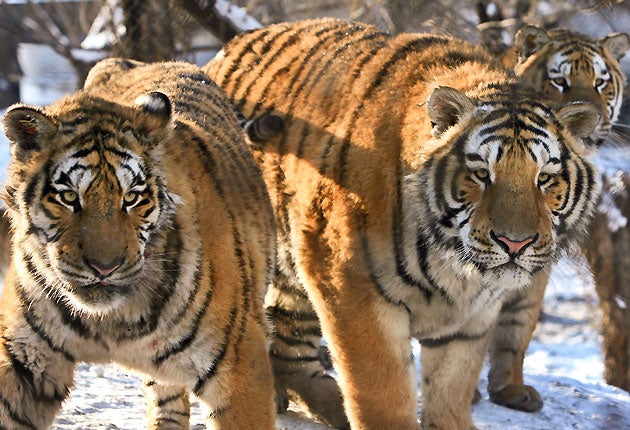Russian circus tigers and lioness die on truck

Your support helps us to tell the story
From reproductive rights to climate change to Big Tech, The Independent is on the ground when the story is developing. Whether it's investigating the financials of Elon Musk's pro-Trump PAC or producing our latest documentary, 'The A Word', which shines a light on the American women fighting for reproductive rights, we know how important it is to parse out the facts from the messaging.
At such a critical moment in US history, we need reporters on the ground. Your donation allows us to keep sending journalists to speak to both sides of the story.
The Independent is trusted by Americans across the entire political spectrum. And unlike many other quality news outlets, we choose not to lock Americans out of our reporting and analysis with paywalls. We believe quality journalism should be available to everyone, paid for by those who can afford it.
Your support makes all the difference.Eight circus tigers and a lioness died during a 20-hour journey in an enclosed and heated truck across Siberia, and Russian police are investigating whether they might have been suffocated by exhaust fumes or sickened with food poisoning.
The animals were dead when they arrived early today in the city of Yakutsk, where they had been due to perform in holiday shows, police spokesman Nikolai Sizykh said.
A third possible cause of death may have been overheating in the truck, the Mechta circus administrator Yevgeny Kudashkin said. Another circus employee said the truck should have been opened every two hours for ventilation, but was not.
A Doberman dog traveling in the same truck survived, Kudashkin said. More dogs and a bear traveling in a second truck arrived healthy.
Circuses, popular in Russia since the 19th century, thrived under Soviet rule with state circus schools training generations of acrobats, clowns and animal trainers. There are still permanent circuses in dozens of Russian cities and town, including two in Moscow, as well as dozens more traveling circuses.
The private Mechta circus — or Dream circus — based in the southern city of Krasnodar, had been performing in the Far Eastern region of Khabarovsk before moving on to Yakutsk, about 1,400 miles (2,400 kilometers) away.
The big cats were last seen alive some 510 miles (820 kilometers) from Yakutsk in the city of Neryungri. Temperatures in Yakutsk were around minus 33 degrees Fahrenheit (minus 36 degrees Celsius) on Tuesday.
Photographs of the dead tigers, one piled on top of another in a cage, appeared on the online news portal Kursor.ru. Some had their abdomens cut open, which the Web site said was done for toxicology tests.
A World Wildlife Fund official in Russia, Natalya Dronova, said the transportation of animals is tightly controlled in circuses under the umbrella of the Russian State Circus Company, the successor of the Soviet-era agency. Russia's private circuses, however, are not sufficiently regulated, the state-owned RIA Novosti news agency quoted her as saying.
About 70 circuses in Russia still receive state funding.
Subscribe to Independent Premium to bookmark this article
Want to bookmark your favourite articles and stories to read or reference later? Start your Independent Premium subscription today.
Join our commenting forum
Join thought-provoking conversations, follow other Independent readers and see their replies
Comments